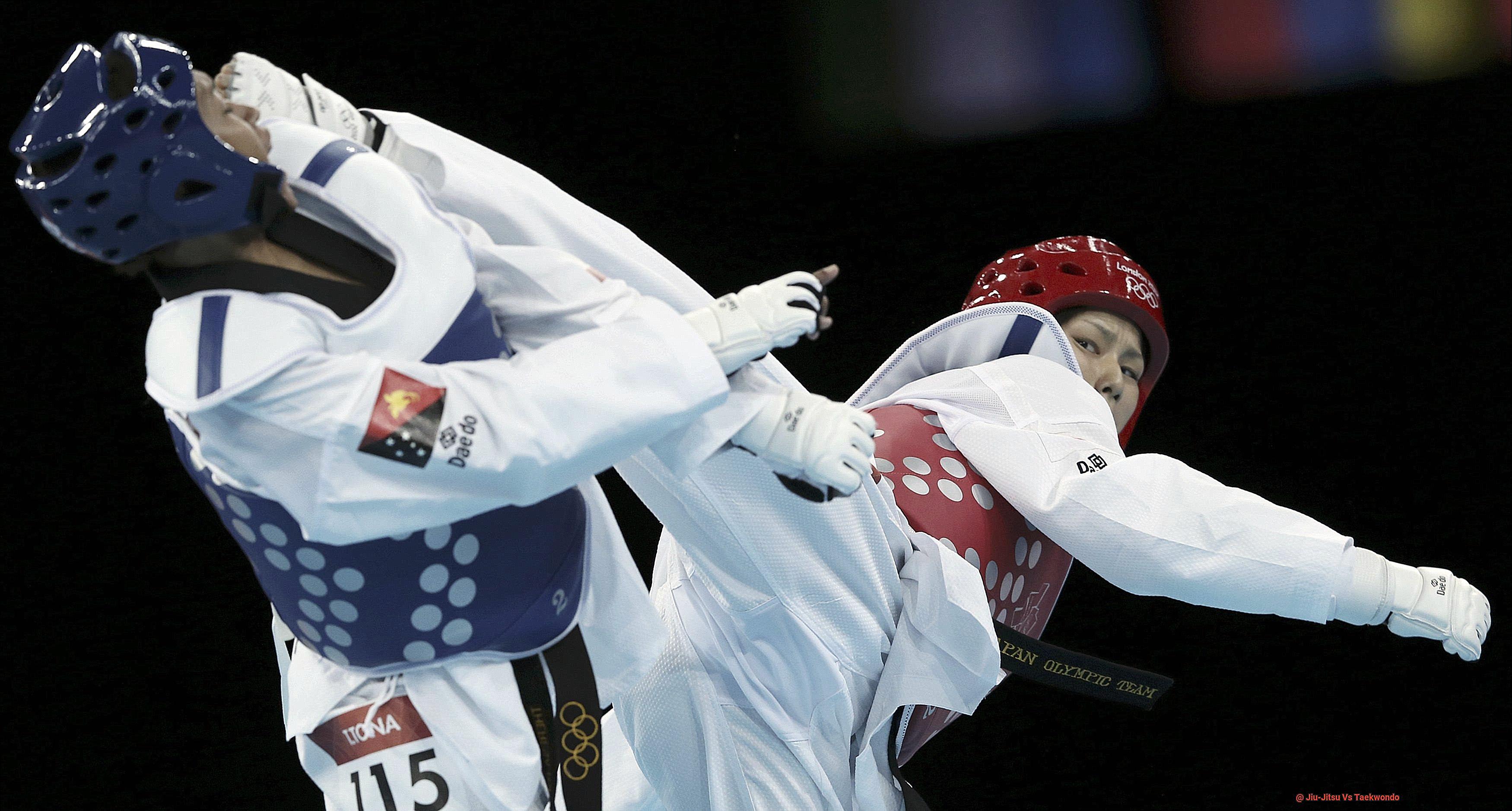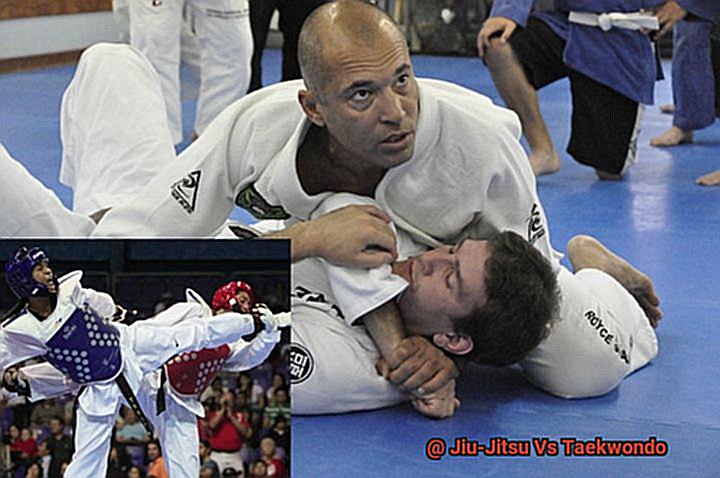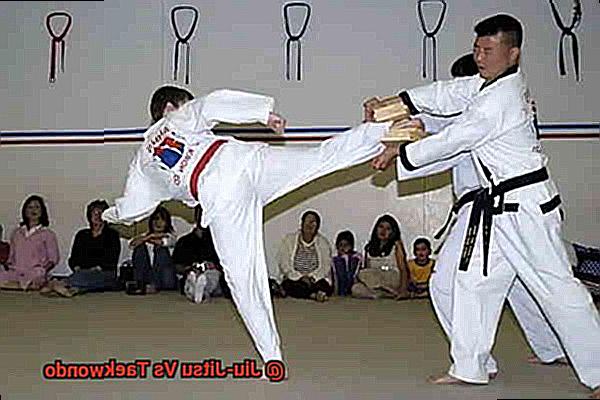Are you ready to embark on a journey into the world of martial arts, but not sure which discipline to choose? Fear not. Taekwondo and Jiu-Jitsu are two of the most popular martial arts in the world, each with their own unique style and techniques. But how do you decide which one is right for you? It all comes down to your personal goals and preferences.
If you’re looking for a striking-based martial art that emphasizes speed and agility, Taekwondo might be just what you need. With its powerful kicks, punches, and blocks, Taekwondo will help improve your overall physical fitness while developing acrobatic skills. On the other hand, if grappling is more your thing, Jiu-Jitsu might be the perfect fit. Using joint locks and chokeholds to immobilize or submit an opponent, Jiu-Jitsu places a greater emphasis on technique and strategy rather than brute strength.
In this blog post, we’ll delve into the differences between Jiu-Jitsu and Taekwondo – from their origins to their benefits and drawbacks. By the end of this article, you’ll have a clearer understanding of which martial art suits your needs best. So let’s get started – it’s time to explore these two fascinating disciplines.
History of Jiu-Jitsu and Taekwondo
Jiu-Jitsu and Taekwondo are two of the most popular martial arts in the world. Their rich histories date back centuries, with Jiu-Jitsu originating in Japan in the 16th century and Taekwondo tracing back to Korea in the 1940s.
Jiu-Jitsu was developed by samurai warriors as a means to defend themselves against armored opponents. Its techniques involved throws, joint locks, and chokes to gain an advantage. Over time, Jiu-Jitsu evolved into different styles, including Brazilian Jiu-Jitsu, which is now widely popular for its focus on ground fighting and submission holds. With its core principles of balance, control, and technique, Jiu-Jitsu practitioners learn how to use leverage to overcome larger and stronger opponents.
Taekwondo, on the other hand, emphasizes fast and powerful kicks as well as punches, blocks, and strikes. Its foundation was based on traditional Korean martial arts and Japanese karate. It also incorporates forms or patterns of movement known as poomsae or kata. Taekwondo underwent a significant transformation in the 1950s when it was officially recognized as a national sport in Korea.
Both martial arts have undergone many changes over the years. In the early 20th century, Jiu-Jitsu was introduced to Brazil where it was further developed and modified to become Brazilian Jiu-Jitsu. Today, both martial arts have gained global popularity with millions of practitioners worldwide.
When it comes to competition, Jiu-Jitsu tournaments typically involve grappling matches where the goal is to submit your opponent through joint locks or chokes. In comparison, Taekwondo competitions involve sparring matches where points are awarded for strikes to specific areas of the body.
In terms of self-defense, both Jiu-Jitsu and Taekwondo can be effective depending on the situation. Jiu-Jitsu is particularly useful in close quarters or ground fighting situations where you need to neutralize an opponent quickly. Taekwondo is more effective in situations where distance needs to be maintained, such as defending against multiple attackers or using kicks to keep an attacker at bay.

Ultimately, the choice between Jiu-Jitsu and Taekwondo comes down to personal preference and goals. Both martial arts offer numerous benefits for physical fitness, mental discipline, and self-defense skills.
Core Principles of Jiu-Jitsu and Taekwondo
Jiu-Jitsu and Taekwondo are two distinct styles that offer unique approaches to self-defense, fitness, and personal growth. However, both styles share some fundamental core principles that make them effective and valuable for practitioners of all levels.
Jiu-Jitsu is like a game of strategy, where you use leverage and technique to control your opponent on the ground. The core principle of Jiu-Jitsu revolves around the concept of leverage, which allows a smaller and weaker person to defeat a larger and stronger opponent. By using your body weight and momentum, you can manipulate your opponent’s movements and eventually force them into submission. It’s like solving a puzzle with your body – you need to find the right angles and timing to make it work.
Taekwondo is like a form of art, where you use speed and power to strike your opponent from a distance. The core principles of Taekwondo are based on the five tenets: courtesy, integrity, perseverance, self-control, and indomitable spirit. These principles teach practitioners to respect their opponents and themselves, develop mental and physical discipline, and strive for continuous improvement. In Taekwondo, you learn how to use your kicks, punches, and blocks to keep your opponent at bay or strike them from a safe distance.
Despite their differences, both Jiu-Jitsu and Taekwondo share some common core principles. Both styles focus on developing physical fitness, mental toughness, self-defense skills, and respect for others. Additionally, both styles teach practitioners to use their bodies efficiently and effectively by maximizing their strengths and minimizing their weaknesses.
In conclusion, understanding the core principles of Jiu-Jitsu and Taekwondo is crucial for anyone interested in learning these martial arts styles. These principles are not only relevant in martial arts but also in everyday life. By mastering the core principles of these martial arts styles, you can become a more skilled and confident practitioner and achieve greater success in your personal and professional life. So, which style resonates with you?
Competition Differences between Jiu-Jitsu and Taekwondo
Step into the world of martial arts, where Jiu-Jitsu and Taekwondo are two of the most popular styles that have captured the hearts of millions worldwide. Although there might be some similarities between these two styles, they differ significantly when it comes to competition.
Jiu-Jitsu competitions involve grappling and submission techniques, where the goal is to control or submit your opponent. Points are awarded for taking your opponent to the ground, achieving dominant positions, and submitting or controlling them. It’s like a chess game on the ground, where strategy and timing are crucial.
In contrast, Taekwondo competitions focus on striking techniques, with kicks, punches, and other strikes aimed at specific areas of the body. Points are awarded for these strikes, and the first competitor to reach a certain number of points or achieve a knockout wins the match. It’s like a fast-paced dance where speed and agility are paramount.
But that’s not all. The level of intensity and physicality involved in Jiu-Jitsu and Taekwondo competitions also differs significantly. Jiu-Jitsu competitions tend to be more low-key and strategic, where technique and timing play a more critical role than brute strength or athleticism. In contrast, Taekwondo competitions can be quite fast-paced and physically demanding, relying on speed, agility, and explosive power.
Moreover, the scoring systems used in these two martial arts styles vary significantly. In Jiu-Jitsu competitions, points are awarded for various maneuvers such as takedowns, sweeps, and submissions.
The goal is to accumulate more points than your opponent during the allotted time period. On the other hand, in Taekwondo competitions, points are scored for striking techniques such as kicks and punches aimed at certain areas of the body.
In conclusion, while Jiu-Jitsu and Taekwondo share core principles that make them valuable for anyone interested in self-defense, fitness, and personal growth, their competition styles, techniques, and rules differ significantly. It’s essential to understand these differences before deciding which one is right for you. So go ahead, explore both of these martial arts styles, and find the one that resonates with you.

Self-Defense Advantages of Jiu-Jitsu and Taekwondo
Look no further than Jiu-Jitsu and Taekwondo. These two popular martial arts offer unique advantages in the realm of self-defense.
Jiu-Jitsu is a grappling-based art that focuses on ground fighting and submission holds. This makes it an ideal choice for self-defense situations where size and strength may be a factor. With Jiu-Jitsu, you’ll learn how to use leverage and technique to control an attacker on the ground, as well as various submission holds to quickly incapacitate them without causing permanent damage.
In a real-life self-defense situation, being able to take an attacker to the ground and control them can be extremely effective. Jiu-Jitsu teaches students how to use leverage and technique to overcome larger opponents, making it a practical choice for those who want to defend themselves.
On the other hand, Taekwondo’s emphasis on striking techniques can be highly effective in self-defense situations too. Taekwondo practitioners are trained in powerful kicks and punches that can be used to keep an attacker at bay or quickly immobilize them. With Taekwondo, you’ll also learn footwork and agility, allowing you to move quickly and evade attacks.
Taekwondo’s explosive power and dynamic kicks make it a popular choice for those looking to improve their self-defense skills. However, if you prefer a more cerebral approach to self-defense, Jiu-Jitsu’s chess game-like strategy may appeal more.
Ultimately, both Jiu-Jitsu and Taekwondo offer unique advantages for self-defense. The best choice depends on personal preferences, physical abilities, and training goals. So why not give them both a try and see which one speaks to you?
Physical Fitness Benefits of Practicing Jiu-Jitsu and Taekwondo
Look no further than Jiu-Jitsu and Taekwondo. These martial arts offer a wide range of physical benefits that can help you achieve your fitness goals while learning valuable self-defense skills.
Jiu-Jitsu is a dynamic martial art that emphasizes grappling and ground fighting techniques. It requires a lot of core strength and body control, making it an excellent way to improve muscular endurance, flexibility, and cardiovascular fitness. With Jiu-Jitsu, you’ll develop balance and coordination skills, as well as increase overall body awareness. Think of it like a game of chess – it requires both physical and mental strength to outmaneuver your opponent.
Taekwondo, on the other hand, is all about high-impact kicks and strikes. It focuses on developing lower body strength and power, making it an excellent way to tone your leg muscles, improve balance, and increase overall agility. With Taekwondo, you’ll enjoy an intense cardiovascular workout that burns calories and improves endurance. Think of it like a dance – it’s all about fluid movements and precise execution.
But that’s not all – both Jiu-Jitsu and Taekwondo offer mental health benefits as well. Improved focus and concentration, stress relief, and increased self-confidence are just a few examples. Plus, they provide an excellent opportunity for social interaction and community building.
No matter what your age or fitness level may be, Jiu-Jitsu and Taekwondo offer a challenging yet rewarding workout that can help you achieve your fitness goals while learning valuable self-defense skills. So why not give them a try?
Mental Discipline Benefits of Practicing Jiu-Jitsu and Taekwondo
Look no further than Jiu-Jitsu and Taekwondo. These martial arts offer a wide range of benefits, including the development of self-discipline, focus, and mental toughness.
One of the most significant advantages of practicing Jiu-Jitsu and Taekwondo is the cultivation of self-discipline. To master these martial arts, it takes dedication, hard work, and patience. By committing to regular training sessions and pushing yourself to improve, you’ll learn to control your impulses and develop a strong sense of self-discipline. Think of it like a puzzle – you need to fit all the pieces together in the right order to succeed.
In addition to self-discipline, Jiu-Jitsu and Taekwondo also help individuals improve their focus. During training, practitioners need to concentrate on specific movements, techniques, and strategies while blocking out distractions. This requires a lot of mental focus and discipline. As you improve your ability to focus during training, you’ll likely find that this skill carries over into other areas of your life as well. Whether it’s at work or school, improved focus can help you accomplish more in less time.
Finally, practicing Jiu-Jitsu and Taekwondo can help you develop mental toughness. These martial arts require a lot of physical and mental endurance. You’ll need to push yourself beyond what you thought possible to improve your skills and abilities. This process helps individuals develop resilience, perseverance, and mental toughness that can help them overcome challenges in their personal and professional lives. You’ll learn that failure is just a temporary setback on the path to success.
Overall, practicing Jiu-Jitsu and Taekwondo offers numerous mental discipline benefits that can help you improve not only in martial arts but also in other aspects of your life. So why not try it out for yourself? You might be surprised at how much you can gain from these dynamic martial arts.
ViNPSp80IKc” >
Conclusion
In conclusion, Jiu-Jitsu and Taekwondo are two of the most popular martial arts in the world, each with its unique style and techniques. While Taekwondo emphasizes speed and agility through powerful kicks, punches, and blocks, Jiu-Jitsu focuses on grappling techniques such as joint locks and chokeholds to immobilize or submit an opponent. Both martial arts have a rich history that dates back centuries and have undergone many changes over time.
When it comes to competition, Jiu-Jitsu tournaments typically involve grappling matches where the goal is to submit your opponent through joint locks or chokes. In comparison, Taekwondo competitions involve sparring matches where points are awarded for strikes to specific areas of the body. Moreover, both martial arts offer numerous benefits for physical fitness, mental discipline, and self-defense skills.
Choosing between Jiu-Jitsu or Taekwondo depends on personal preferences and goals. Both styles share common core principles that make them effective and valuable for practitioners of all levels. They teach respect for others and oneself while developing mental toughness, self-discipline, resilience, perseverance, focus, and self-confidence.
Ultimately, practicing Jiu-Jitsu or Taekwondo offers a challenging yet rewarding workout that can help you achieve your fitness goals while learning valuable self-defense skills. Additionally, these dynamic martial arts can help individuals develop mental discipline that can improve other aspects of their lives.
So why not give them a try? You might be surprised at how much you can gain from these exciting forms of exercise.






